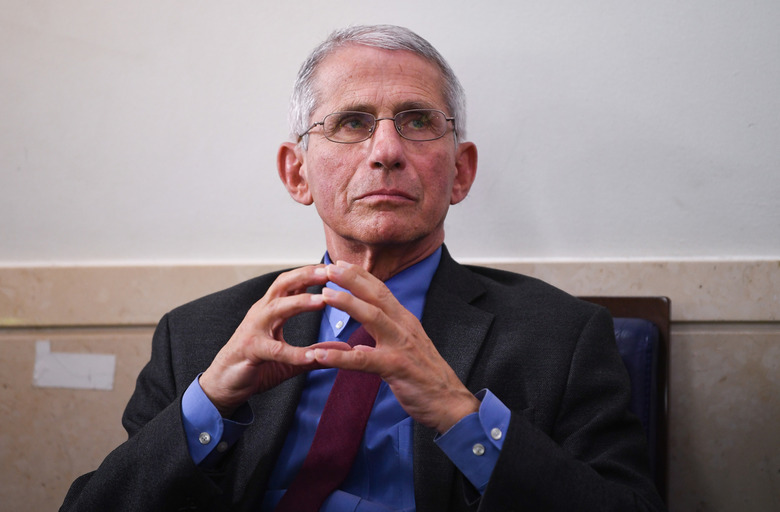Coronavirus Medicine Remdesivir Just Got Its Most Important Endorsement Yet
- A National Institutes of Health (NIH) trial involving more than 1,000 patients revealed that remdesivir can help COVID-19 patients recover faster.
- Dr. Anthony Fauci said that the drug will become the standard of care for the novel coronavirus disease.
- The study hasn't been published or peer-reviewed and some questions still remain, but the early results seem very promising.
- Visit BGR's homepage for more stories.
We've been talking about remdesivir for quite a while since the novel coronavirus pandemic started. It's one of the proposed COVID-19 therapies that's been used in all sorts of trials around the world, a drug that has been initially developed to fight the Ebola virus. In the past few days, we saw remdesivir studies that delivered not-so-great news, but also leaked research that revealed the drug is quite promising at treating some COVID-19 patients. But it was Dr. Anthony Fauci who gave the biggest remdesivir endorsement on Wednesday. The drug is good news for COVID-19 patients and will become the standard of care in the US, where a study delivered relevant data about the drug's effectiveness against the novel virus. However, it's not all good news, as the drug might not be able to reduce the mortality rate.
Contradicting results
Before Fauci got a chance to talk about remdesivir becoming the new standard of COVID-19 care, we saw a couple of studies that delivered contradicting reports. First, a couple of weeks ago, doctors from the University of Chicago Medicine discussed remdesivir research that involved 125 people in two Phase 3 trials. The conclusions of that study leaked, revealing that most patients were severe, and most of them recovered faster than expected. Only two died. Those results were preliminary, as they were yet to be published.
A week after that, hydroxychloroquine and remdesivir research conclusions were revealed for other studies. The remdesivir study from China that the World Health Organization (WHO) published was of particular interest. The results showed there was no difference between the remdesivir and placebo groups in the trial when it comes to recovery time. But that study was stopped early due to unspecified adverse reactions to the medicine.
The new studies
Fauci's surprising remdesivir remarks came on Wednesday during a White House briefing. The top US infectious disease expert revealed the early conclusion of an even bigger remdesivir study performed by the US government. The study showed that patients on remdesivir recovered 31% faster than the ones on placebo. That's "highly significant," Fauci said.
"This is really quite important," the doctor told reporters, likening the discovery to a moment in 1986 "when we were struggling for drugs for HIV, and we had nothing."
"This will be the standard of care," Fauci added.
NIH's National Institute of Allergy and Infectious Diseases included 1,063 patients in the trial, Reuters reports. But the research is yet to be published or reviewed by peers.
Partial results showed that patients on remdesivir recovered in 11 days, while those on placebo pills needed 15 days to recover. Fauci said the results were announced earlier because of ethical responsibility to allow patients on placebo to get remdesivir, NPR reports. Remdesivir therapy might increase the chances of survival, but some people might still die of COVID-19 despite getting the treatment. The study showed that 8% of people given the drug died compared to 11.6% for the placebo group.
Fauci said the study from China was underpowered. "I don't like to pooh-pooh other studies, but that's not an adequate study, and everybody in the field feels that," he said. Comparatively, he referred to the NIH study as "truly high powered" because it involved more than 1,000 patients from hospitals in numerous countries. The expert added the study has proved "that a drug can block this virus." Even so, the research needs to be peer-reviewed by others once it's published.
The next step is to examine combining remdesivir with other drugs, like an anti-inflammatory drug, to see how they compare to using remdesivir alone.
In a separate Gilead study detailed by Reuters, Gilead looked at how the drug works in severe COVID-19 cases. The study included 397 patients who were given the medication for five days or 10 days. Gilead noted that clinical improvements were similar regardless of the duration of the therapy. Patients treated early with remdesivir did better than patients who received the drug later.
The drugmaker is also looking at remdesivir's effectiveness in patients with less severe COVID-19, but the results will be released next month.
Finally, remdesivir is also part of a larger WHO study, whose results are yet to be revealed. It's unclear if any of the studies mentioned here are also part of WHO's mega trial.
